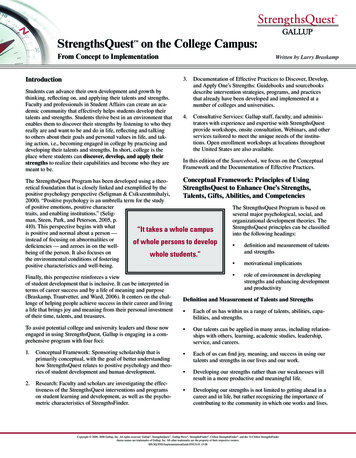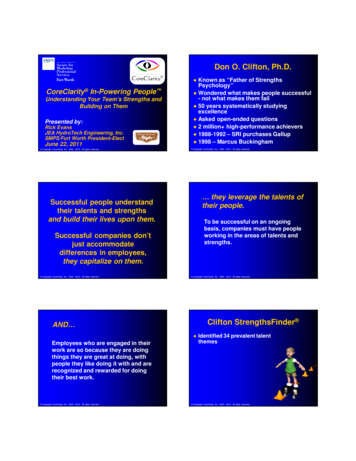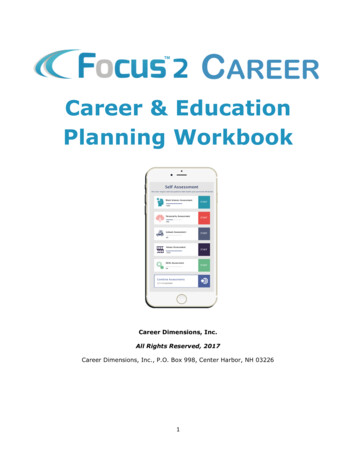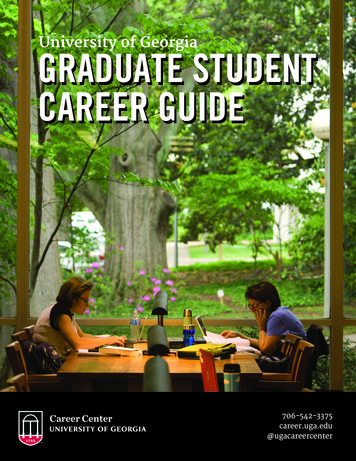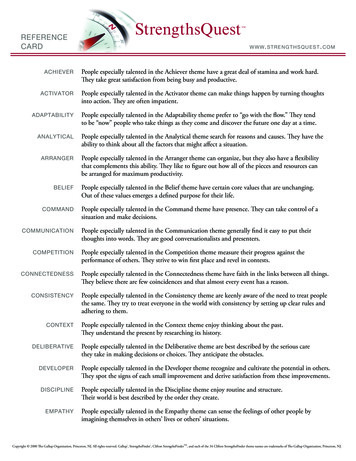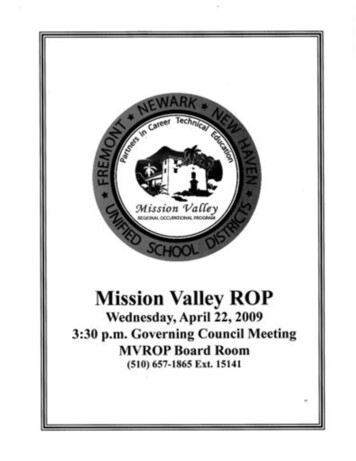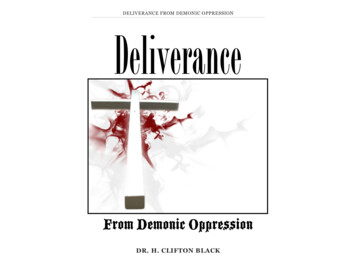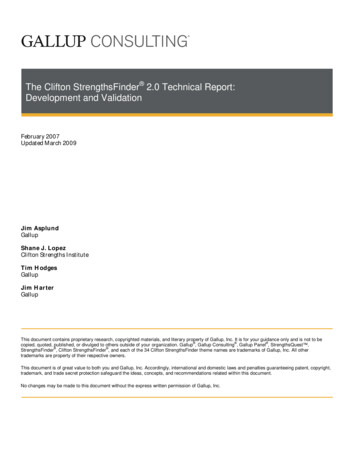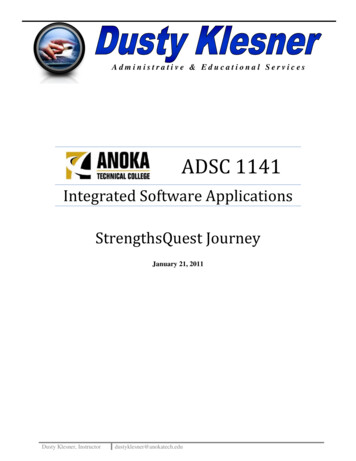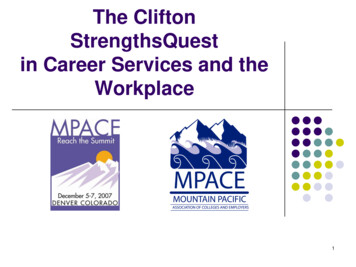
Transcription
The CliftonStrengthsQuestin Career Services and theWorkplace1
The Clifton StrengthsQuestin Career Services and the WorkplacePresenters: Eileen McGarry – Executive Director, CareerService, University of Nevada Las Vegas Charlie Howard – Director, Career Services,Point Loma Nazarene University Doug Stude – Assistant Director, CareerServices, Azusa Pacific University2
The Clifton StrengthsQuestin Career Services and the Workplace Outline and Overview of PresentationBrief Intro – CharlieOverview of Strengths – DougThe Workplace Setting – EileenPLNU Use of Strengths – CharlieAPU Use of Strengths – DougUNLV – Students/Employers/Staff teamuse of Strengths – EileenQuestions?3
Charlie’s Strengths ContextResponsibilityHarmonyBeliefRelator4
The Clifton StrengthsQuestin Career Services and the Workplace With a paper and pencil/pen, using your dominanthand, sign your name 5 times.Now switch hands and sign your name 5 times withyour secondary hand.What observations do you see in this challenge?Degree of difficulty in signing your name with yourdominate hand vs. your other hand?We do things/ we are successful because we usethose things that are (?natural) to us.5
What is a strength? Strength the ability to provide consistent,near-perfect performance in a given activity Enables and equips you to do certain thingsvery well Talent Knowledge Skills Strength6
Background of CliftonStrengthsQuest The Gallup OrganizationDonald Clifton – University of Nebraska Over 2 million interviews to-date 36 countriesBusiness Administrators, Educators, Lawyers,Housekeepers, Medical Professionals, Athletesetc.Themes emerged: named 400 strengths – narrowed tothe 34 themes gauged by the Strengths FinderFindings “best of the best” all focused on their strengths7
How is Strengths used? To understand yourself from a different perspective Helps you to see your full unique potentialArticulates what has always been “natural”Serves as a guide to successLets you know how to steward your strengthsTo understand others in terms of what‟s “right” about them Encourages teams of people to work together morecohesively and efficientlyAssists in helping others recognize where they are differentand the benefits that can come from those differences8
How is Strengths different? Society: Identify, analyze and fix areas of weakness tobecome strongStudy failure to understand successValue placed on well-roundedness, “renaissanceman” viewLanguage of frailty: Psychosis, schizophrenia,multiple personality disorderNon-experts have understanding of this language9
The difference is Strengths Finder: (Positive Psychology) Provides language for what and how people dothings wellManage weaknesses Gather people around you who can cover those areasUse strengths to manage weaknessesBuild life around strengths Study success to understand successBank of America 10
The StrengthsFinderAssessment The SQ instrument – the CliftonStrengthsFinder – 180 paired comparisonitems.Online assessment takes 30 minutesImmediately receive a report that lists theirtop five themes of talent in order of theirdominance for each individual.11
Focusing on your uniqueness 34 different strengths 33,700,000 combinations of the top 5strengths You can do one thing better than the next10,000 people12
Understanding Strengths Relating – how you see others and build relationships Impacting – how you influence others Striving – how you attain goals and approach tasks Thinking – how you collect and organize information13
List of 34 Strengths thyFocus eStrategicWoo14
A leader’s perspective Assess strengths of teamPlug them into positions where they will beable to use and develop their strengths on aconsistent basisMentor and lead them in a way that will speakto their strengthsHelp them determine how to use theirstrengths to build up areas of weakness15
StrengthsQuest Chip Anderson – “Discover and Develop YourStrengths in Academics, Career, andBeyond”Ability to see 34 Strengths and know how todevelop your top 5 to bring personal successTake understanding of your top 5 Strengthsand see how you can be an academicsuccess16
StrengthsQuest Tools to use in connecting your Strengths toAcademics, Career, and Beyond.http://www.strengthsquest.com/Sections in StrengthsQuest Description, development, academics,careers.17
Doug’s Strengths cy(Belief)18
Eileen’s Strengths MaximizerEmpathyStrategicSelf-assuranceInput19
Strengths in the Workplace Research shows only 17% of employees usetheir strengths at workCorporate cultures often center on “fixingweaknesses”Peter Drucker, 1966 The Effective Executive– “The effective executive builds on strengths – theirown strengths, the strengths of superiors, colleagues,subordinates and on the strengths of the situation.”20
Strengths Movement TakingHold Wells Fargo, Intel, Best Buy, AccentureToyota – 3 day Great Manager TrainingYahoo – Require SQ Survey for allemployeesNon – Profits – U.S. Coast Guard, AmericanSociety on Aging, New Zealand Ministry ofYouth DevelopmentIngham County Michigan- Juvenile JusticeSystem21
Most Recent WorkplaceApplications “Go Put Your Strengths to Work”, MarcusBuckingham – Co-Author of the International Best sellers“First Break all the Rules” and „Now, Discover your Strengths” Assess how engaged your Strengths are inthe Workplace – www.simplystrengths.comStrengths Engagement Track (SET)measures how you are engaging strengths inyour work and combine individual scores tolook at the team22
Most Recent CampusApplications Point Loma Nazarene University(slides # 24 - #38)Azusa Pacific University(slides # 39 - # 42)University of Nevada, Las Vegas(slides # 43 - # 46)23
Point Loma Nazarene UniversityNew Student OrientationStrengthsQuest Session OutlineWhat you should have on hand:1. Cardstock and markers.2. Strengths Quest Short Definition List (Theme Descriptions) for everystudent.3. Your 34 Strengths Themes Discussion Guide.4. Strengths Quest session evaluation forms (for students and forfacilitators.TimeActivity10:00 a.m. Go early to meeting room. Write your name and Strengthson the board. Make sure that cardstock and pens/markersare available for students.24
Session Begins10:10 a.m. As students are entering have them write their name and 5strengths on the card stock and create a table so that you cansee their name and strengths10:15 a.m. Introductions of facilitator(s)10:20 a.m. Facilitators: share your strengths and the impact that theyhave had on your life – personal, work, spiritual, career etc.This is very important to think about ahead of time andprepare for, as it may be the most impacting part of theevent. Be careful to not drag this on too much because youwill want to share your stories later as examples.(15 Minutes)25
Session Continued10:35 a.m. Begin going through the different strengths.1. For the first few strengths pick ones that you are very familiarwith so that you can direct the conversation well.2. Ask the students who have that strength to raise their hand.3. Pick one of those students to read the short description of thestrength.4. Ask them to give an example of that strength in their ownexperience. If they have difficulty coming up with anything thenask one or more of the questions from the SQ question sheet.5. Allow other students with that strength to talk as well.6. It is very important here that you let the students speak aboutthemselves.7. Also – try and keep discussions on each strength to at most 7minutes. This will allow you to get through about 8 or 9strengths which is only a quarter of them!8. Try to pick strengths that it looks like are dominant in the room(by looking at their table tents). If there are strengths that youare not as comfortable with – that is ok – share that it is not oneof your strengths and ask the students who have that strength to26explain it.
Session Concludes11:45 a.m. Concluding Remarks: NoonStart by saying – “I know that we haven’t had time to get throughall of the strengths, but you will have more opportunitiesthroughout the school year to explore them.”Encourage them to print out their book from the StrengthsQuestwebsite (http://student.strengthsquest.com).Remind them that they can get the advice sheets from CareerServices and Spiritual Development (remind them where theyare located).Share with them that their RDs and RAs are trained to help themthink through their strengths as well as other studentdevelopment professionals and faculty. Encourage them to talkto these resource people to explore their strengths further.Finished27
2007 Freshman ProfileClarity of Reported Preferences: ISFJVery ClearClearModerateSlightSlightModerateExtroversion EClearVery ClearI Introversion147Sensing SN Intuition7Thinking TF Feeling19Judging JPCI ResultsP PerceivingIntroversion 14Sensing 7Feeling 7Judging 1928
Summary of MBTI Results - ISFJ2007 Freshman ProfileEExtraversion People who prefer Extraversiontend to focus their attention onthe outer world of people andthings.IIntroversion - (Harmony)People who prefer Introversiontend to focus their attention onthe inner world of ideas andimpressions.Whereyou focusyourattention29
SSensing – (Discipline, Achiever)People who prefer Sensing tend totake in information through thefive senses and focus on the hereand now.NIntuition – (Arranger)People who prefer Intuitiontend to take in informationfrom patterns and the bigpicture and focus on futurepossibilities.The way youtake ininformation30
TThinking –People who prefer Thinking tendto make decisions based primarilyon logic and on objective analysisof cause and effect.FFeeling – (Discipline, Harmony,Responsibility)People who prefer Feeling tend tomake decisions based primarilyon values and on subjectiveevaluation of person- centeredconcerns.The way youmakedecisions31
JJudging – (Discipline, Harmony,Responsibility, Achiever, Arranger)People who prefer Judging tendlike planned and organizedapproach to life and prefer to havethings settled.PPerceiving – (Arranger)People who prefer Perceivingtend to like a flexible andspontaneous approach to lifeand prefer to keep their optionsopen.How youdeal withthe outerworld32
Clifton StrengthsFinderTheme DescriptionsDisciplinePeople strong in the Discipline theme enjoy routine andstructure. Their world is best described by the order theycreate.HarmonyPeople strong in the Harmony theme look for consensus.They don’t enjoy conflict; rather, they seek areas ofagreement.ResponsibilityPeople strong in the Responsibility theme take psychologicalownership of what they say they will do. They are committedto stable values such as honesty and loyalty.AchieverPeople strong in the Achiever theme have a great deal ofstamina and work hard. They take great satisfaction frombeing busy and productive.ArrangerPeople strong in the Arranger theme can organize, but theyalso have a flexibility that complements this ability. They liketo figure out how all of the pieces and resources can bearranged for maximum productivity.33
Strengths Themes Discussion GuideDiscipline – How does order help you? How do you like to have your daystructured? Describe your room.Harmony – Describe how you encourage others to work together or howyou help people in conflict reach an agreeable consensus.Responsibility – Do you ever feel guilty? For what? When? What do youfeel responsible for right now? How often do you say “no”?Achiever – Tell me about a typical day for you. What is it like to havethis strength? What do you enjoy about your day? What goals are youworking toward?Arranger – List all of the “balls” you have in the air at the moment. Whatdo you like best about pulling all of the pieces together? Do you enjoyorganizing a big event?34
Discipline - General DescriptionYour world needs to be predictable. It needs to be ordered andplanned. So you instinctively impose structure upon your world.You set up routines. You focus on timelines and deadlines. Youbreak long-term projects into a series of specific, short-term plans,and you work through each plan diligently. You are not necessarilyneat and clean, but you do need precision. Faced with the inherentmessiness of life, you want to feel in control. The routines, thetimelines, the structure; all of these help to create this feeling ofcontrol. Lacking this theme of Discipline, others may sometimesresent your need for order, but there need not be conflict. Youmust understand that not everyone feels your urge forpredictability; they have other ways of getting things done. Likewiseyou can help them understand and even appreciate your need forstructure. Your dislike of surprises, your impatience with errors,your routines, and your detail orientation don’t need to bemisinterpreted as controlling behaviors that box people in. Rather,these behaviors can be understood as your instinctive method formaintaining your progress and your productivity in the face of life’smany distractions.35
Discipline – Career Description Take part in organizing events and people.Your organizing skills should be helpful in administrative positions.Find jobs that require exactness.You will be appreciated in most work settings because of your followthrough and the fact that you work systematically.You can do a lot to help others become organized. This makes thembecome more effective and improves their follow-through. You willbe making a valuable contribution.In many ways you are a perfectionist. While some may criticize yourperfectionism, just think of all the professions in which you wouldn’twant someone who wasn’t a perfectionist (e.g., airplane pilot, brainsurgeon, accountant, etc.).Take on a career in which you can maintain order for yourself andothers.36
Discipline - Spiritual DescriptionBut all things should be done decently and in order. 1 Corinthians 14:40All this, in writing at the Lord’s direction, he made clear to me—the plan of all theworks.1 Chronicles 28:19The plans of the diligent leads surely to abundance, but everyone who is hastycomes only to want. Proverbs 22:1-5If you are particularly talented in Discipline, you enjoy routine and structure.Your world is best described by the order you create.1. Volunteer to be part of a cleaning day at your church. Help bring neatness andorder to the area you are assigned.2. Volunteer to create a timeline, including celebrations of milestones for majorprojects in your church, such as a building fund campaign, Sunday schoolattendance recognition, or a “paint-a-thon.”3. Volunteer to keep the church calendar of events current and accurate.4. Make Bible reading and prayer part of your daily routine. You’ll come to lovethe predictability, and you will grow spiritually as a result.5. In your Bible study, look for time when God brought chaos. You’ll see it inGenesis at the Creation, and you will see it all the way through Revelation,37when God returns to claim His own out of worldly chaos.
Discipline - Spiritual Continued6.7.8.9.10.Recognize that others may not be as disciplined as you are.Sometimes, their processes will seem clumsy and disorganized to you.Try to look beyond the processes, and instead assess the results.Remember that even though God brought you out of chaos in Creation,the crowning achievement of Creation was fallible, unpredictablehuman beings.Volunteer to help keep or organize your church’s records. YourDiscipline talents will make preparing the annual report much easier.In fact, you may enjoy preparing the report, gathering and organizingall the information so that it is a coherent whole.Learn the art of forgiveness, especially the art of forgiving yourself.Even though perfection is your goal, accept the fact that you andothers will rarely Recognize that mistakes might depress you.Precision is a core part of who you are; however, you must find ways tomove through these moments of annoyance to prevent becomingdiscouraged.reach perfection. Forgive and move on, celebrating the excellenceachieved in spite of imperfection.Choose to serve on committees and join groups in the church that havestructure and established routines. Groups and committees withoutwell-defined processes and expectations will frustrate you.38
Strengths Use at APU Strengths-based CampusFreshmen “Beginnings” CSA 101 course-10 week intro course; take Strengths; useactivities, exercises, reflection, etc on SQSophomore ProgramOmega (seniors) ProgramPresident, Trustee, Administration, Faculty,Staff – training times39
Strengths at APU continued Lilly Vocation Initiative grant subsidizes online SQcodes for Transfers.Career Services staff trained in Strengths; requireTransfers Students taking SQ assessment to a onehour session with Career CounselorUnderstanding that success in the past, present orfuture comes because of StrengthsAcademic Success – chapters in SQ bookCareer Planning – chapters in SQ book40
Strengths at APU continued “Calling, Major, and Career Exploration: AStrengths-Based Approach to Life Planning”3 unit course; takes Dr. Anderson‟s online 10sessions into a classroom setting.Gallup research indicates a need for 5-6hours of reflection, action, exercise to reallyunderstand our Strengths and use.41
Strengths at APU continuedNoel Academy for Strengths-BasedLeadership and Education housed at APUhttp://www.apu.edu/strengthsacademy/ Other gallup.com/ 42
Strengths Use at UNLV Looked for Professional Development Tool Institution with growing pains & over-stretched staffWorkplace concernsNeed for a positive focusMaximize work teams and productivityStudent Affairs Training & Development Committee Faculty presenter already versed in StrengthsOffered SQ Assessment and session each semester for 25student affairs staff – booked quickly with waiting listT&D Committee members pursued training43
Career Services (CS) StaffDevelopment All CS staff took Strengths FinderHalf day retreat for staff teamFollow up exercises in each staff meeting Each team member describes a strength and howused in work environmentTheme dynamics – explore how team membersthemes compliment each other and where conflictmay arise.Maximizing talent – explore how we use strengthsaround team projects and define staff roles.44
Results and Future Directions Two Student Affairs staff trained.Request for presentations with student leadersRequest for department sessions and work withleadership teams – interest in work with studentsAllows teams to redefine roles and effectively usetalents when pursuing projectsCreates more dialogue around strengths forrelationship/team buildingFuture implications for campus work around studentretention and Career Services45
The Clifton StrengthsQuestin Career Services and the Workplace QUESTIONS? Further contact:Eileen McGarry – eileen.mcgarry@unlv.eduCharlie Howard –CharlieHoward@pointloma.eduDoug Stude – dpstude@apu.edu46
THANKS FOR ATTENDING!The Clifton StrengthsQuestin Career Services and theWorkplace47
5 The Clifton StrengthsQuest in Career Services and the Workplace With a paper and pencil/pen, using your dominant hand, sign your name 5 times. Now switch hands and sign your name 5 times with your second
